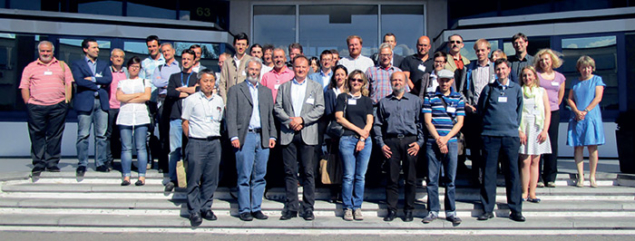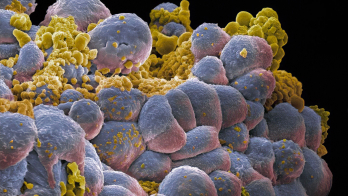
Image credit: OPEN-PHO-ACCEL-2015-008-1.
EuroCirCol, the EC-funded part of the Future Circular Collider (FCC) study that will develop the conceptual design of an energy-frontier hadron collider, officially started on 1 June. The “kick-off” event at CERN on 2–4 June brought together 62 participants to constitute governance bodies, commit to the project plan and align the organization, structures and processes of 16 institutions from 10 countries. The goal of the project is to conceive a post-LHC research infrastructure around a 100-km circular hadron collider capable of reaching 100-TeV collisions. The project will run for four years, with a total estimated budget of €11.2 million, which includes a €2.99 million contribution from the European Commission’s Horizon 2020 programme on developing new world-class research infrastructures.
EuroCirCol will deliver a design for a hadron collider as part of the broader FCC study (CERN Courier April 2014 p16). It will provide input to an accelerator-infrastructure road map, taking into account European and global interests by the time of the next update of the European Strategy for Particle Physics in 2018. It was the only one of 39 submissions to receive the maximum points from reviewers, a clear sign that high-energy physics remains a top priority for the European Commission.
EuroCirCol is organized around four technical work packages. The first two are to develop the collider’s lattice and beam optics, including the experimental regions. A third develops prototypes and tests a novel cryogenics beam-vacuum system that can respond to the challenges of the high levels of synchrotron radiation expected at such a collider. This work also pioneers collaboration between the particle-physics and light-source communities, with opportunities to improve existing synchrotron-radiation facilities and to reduce cost and performance of fourth- or fifth-generation light sources. The fourth work package will study a viable design for a 16-T accelerator magnet, as part of a worldwide study of conductor R&D for the High-Luminosity LHC project and the FCC.
The EuroCirCol project is set to create opportunities for doctoral and postdoctoral assignments in the areas of beam optics and accelerator technologies, in the participating institutes. It will also provide excellent training opportunities for the next generation of accelerator physicists, under the guidance of world-renowned experts in the field.
As a building block in the globally co-ordinated strategy of the FCC study to produce a global design for a global machine, EuroCirCol’s main outcome will be to lay the foundations for subsequent research-infrastructure development that will strengthen Europe as a leader in global research co-operation over the coming decades.
• For more information about EuroCirCol, visit cern.ch/eurocircol.







